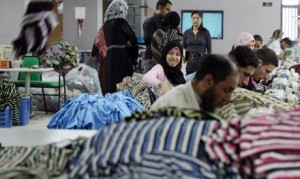
(AFP File Photo)
The German-Arab Chamber of Industry and Commerce (GACIC) signed an agreement with the International Labour Organisation (ILO) to train and employ low-income Egyptian women on 3 November. The agreement is said to improve the skills of 1,000 Egyptian women and help them find jobs in the textile industry.
The agreement, which comes as part of the initiative for providing a suitable environment to activate the “Fundamental Principles and Work Rights for Women in Egypt”, was signed by Youssef Qaryouti, the head and representative of the ILO in Egypt, and the Forum of Training and Technical Education FORTE, represented by the CEO OF GACIC Rainer Herret.
The agreement will be effective over the period of a year where 1,000 low-income women will be trained in the textile and garments production sector under the supervision of GACIC. Following the training, the factories, where the training will be provided, will sign a one year contract with the trainees.
Minister of Manpower and Immigration Kamal Abou Eita and Hany Mehana, assistant to the Minister of Social Solidarity, were also amongst the attendees along with several government officials.
Earlier in September, GACIC announced that it will help 150 workers in Luxor gain new skills in the field of construction aiming to provide alternative job opportunities to Luxor’s labourers.
The project, which has a €250,000 budget, is built on the “training of trainees” concept, with six Egyptian workers selected for training in Germany. Once they finish their workshop, they will return to Egypt and pass on their skills to the selected 150 trainees.
The chamber has a similar project in Cairo, but on a bigger scale, where around 1,000 workers are being trained for one year.




